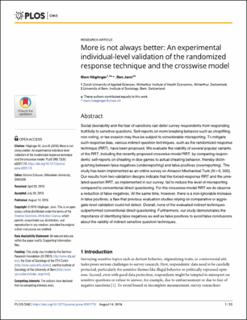Please use this identifier to cite or link to this item:
https://doi.org/10.21256/zhaw-3980Full metadata record
| DC Field | Value | Language |
|---|---|---|
| dc.contributor.author | Höglinger, Marc | - |
| dc.contributor.author | Jann, Ben | - |
| dc.date.accessioned | 2018-09-10T12:59:42Z | - |
| dc.date.available | 2018-09-10T12:59:42Z | - |
| dc.date.issued | 2018 | - |
| dc.identifier.issn | 1932-6203 | de_CH |
| dc.identifier.uri | https://digitalcollection.zhaw.ch/handle/11475/10362 | - |
| dc.description.abstract | Social desirability and the fear of sanctions can deter survey respondents from responding truthfully to sensitive questions. Self-reports on norm breaking behavior such as shoplifting, non-voting, or tax evasion may thus be subject to considerable misreporting. To mitigate such response bias, various indirect question techniques, such as the randomized response technique (RRT), have been proposed. We evaluate the viability of several popular variants of the RRT, including the recently proposed crosswise-model RRT, by comparing respondents' self-reports on cheating in dice games to actual cheating behavior, thereby distinguishing between false negatives (underreporting) and false positives (overreporting). The study has been implemented as an online survey on Amazon Mechanical Turk (N = 6, 505). Our results from two validation designs indicate that the forced-response RRT and the unrelated-question RRT, as implemented in our survey, fail to reduce the level of misreporting compared to conventional direct questioning. For the crosswise-model RRT we do observe a reduction of false negatives. At the same time, however, there is a non-ignorable increase in false positives; a flaw that previous evaluation studies relying on comparative or aggregate-level validation could not detect. Overall, none of the evaluated indirect techniques outperformed conventional direct questioning. Furthermore, our study demonstrates the importance of identifying false negatives as well as false positives to avoid false conclusions about the validity of indirect sensitive question techniques. | de_CH |
| dc.language.iso | en | de_CH |
| dc.publisher | Public Library of Science | de_CH |
| dc.relation.ispartof | PLOS ONE | de_CH |
| dc.rights | http://creativecommons.org/licenses/by/4.0/ | de_CH |
| dc.subject.ddc | 000: Allgemeines und Wissenschaft | de_CH |
| dc.title | More is not always better : an experimental individual-level validation of the randomized response technique and the crosswise model | de_CH |
| dc.type | Beitrag in wissenschaftlicher Zeitschrift | de_CH |
| dcterms.type | Text | de_CH |
| zhaw.departement | School of Management and Law | de_CH |
| zhaw.organisationalunit | Winterthurer Institut für Gesundheitsökonomie (WIG) | de_CH |
| dc.identifier.doi | 10.21256/zhaw-3980 | - |
| dc.identifier.doi | 10.1371/journal.pone.0201770 | de_CH |
| dc.identifier.pmid | 30106973 | de_CH |
| zhaw.funding.eu | No | de_CH |
| zhaw.issue | 8 | de_CH |
| zhaw.originated.zhaw | Yes | de_CH |
| zhaw.pages.end | 22 | de_CH |
| zhaw.pages.start | 1 | de_CH |
| zhaw.publication.status | publishedVersion | de_CH |
| zhaw.volume | 13 | de_CH |
| zhaw.publication.review | Peer review (Publikation) | de_CH |
| Appears in collections: | Publikationen School of Management and Law | |
Files in This Item:
| File | Description | Size | Format | |
|---|---|---|---|---|
| More is not always_PLOSONE 2018.pdf | 1.49 MB | Adobe PDF |  View/Open |
Show simple item record
Höglinger, M., & Jann, B. (2018). More is not always better : an experimental individual-level validation of the randomized response technique and the crosswise model. Plos One, 13(8), 1–22. https://doi.org/10.21256/zhaw-3980
Höglinger, M. and Jann, B. (2018) ‘More is not always better : an experimental individual-level validation of the randomized response technique and the crosswise model’, PLOS ONE, 13(8), pp. 1–22. Available at: https://doi.org/10.21256/zhaw-3980.
M. Höglinger and B. Jann, “More is not always better : an experimental individual-level validation of the randomized response technique and the crosswise model,” PLOS ONE, vol. 13, no. 8, pp. 1–22, 2018, doi: 10.21256/zhaw-3980.
HÖGLINGER, Marc und Ben JANN, 2018. More is not always better : an experimental individual-level validation of the randomized response technique and the crosswise model. PLOS ONE. 2018. Bd. 13, Nr. 8, S. 1–22. DOI 10.21256/zhaw-3980
Höglinger, Marc, and Ben Jann. 2018. “More Is Not Always Better : An Experimental Individual-Level Validation of the Randomized Response Technique and the Crosswise Model.” Plos One 13 (8): 1–22. https://doi.org/10.21256/zhaw-3980.
Höglinger, Marc, and Ben Jann. “More Is Not Always Better : An Experimental Individual-Level Validation of the Randomized Response Technique and the Crosswise Model.” Plos One, vol. 13, no. 8, 2018, pp. 1–22, https://doi.org/10.21256/zhaw-3980.
Items in DSpace are protected by copyright, with all rights reserved, unless otherwise indicated.